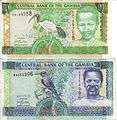Gambian dalasi
| Gambian dalasi | |
|---|---|
|
25 dalasi note and coins from 5 bututs to 1 dalasi | |
| ISO 4217 | |
| Code | GMD |
| Denominations | |
| Subunit | |
| 1/100 | butut |
| Symbol | D |
| Banknotes | 5, 10, 20, 25, 50, 100, 200 dalasis |
| Coins | 1, 5, 10, 25, 50 bututs, 1 dalasi |
| Demographics | |
| User(s) |
|
| Issuance | |
| Central bank | Central Bank of the Gambia |
| Website |
www |
| Valuation | |
| Inflation | 6% |
| Source | The World Factbook, 2013 est. |
The dalasi is the currency of the Gambia. It is subdivided into 100 bututs. The dalasi was adopted in 1971. It replaced the Gambian pound at a rate of 1 pound = 5 dalasis, i.e., 1 dalasi = 0.2 pound = 4 shillings.
Coins

In 1971, coins in denominations of 1, 5, 10, 25 and 50 bututs and 1 dalasi were introduced. The 1 and 5 bututs were struck in bronze while the 10 bututs was brass and the 25, 50 bututs and 1 dalasi were cupro-nickel. The reverse designs of the three higher denominations were taken from the corresponding denominations of the previous currency (1, 2 and 4 shillings), with the reverse designs for the lower three coins coming from the 6, 1 and 3 pence coins, respectively. All coins of this series depict former president, Dawda Jawara.
New 1 dalasi coins were introduced in 1987, modelled on the 50 pence coin of the United Kingdom. These replaced the larger, round dalasi coins which never saw its widespread use as the lower denominations.
In 1998, a new coin series was introduced, in which the effigy of Dawda Jawara was dropped and replaced with the national coat of arms on the obverses. However, older Jawara era coins still commonly circulate as legal tender. The 1 dalasi coin was also downsized in size and weight, but none of the other coins were changed. Only 25 and 50 bututs and 1 dalasi coins are currently in circulation, they are of the 1998 issue which also included 1, 5 and 10 bututs coins but have since disappeared due to low valuation.
Banknotes
Banknotes currently in circulation are 5, 10, 25, 50 & 100 dalasis. 1 dalasi notes were issued between 1971 and 1987. Current banknotes were first issued on 27 July 1996, then reprinted in 2001. On 27 July 2006, the Central Bank of the Gambia issued a new series of notes with images similar to the preceding issues, but with improvements in the design, paper thickness, and security features. Most noticeably, the old white borders have been removed. Furthermore, the 5- and 10-dalasi are coated with a special varnish to extend circulation life. Finally, the security features of the 100-dalasi have been upgraded by the inclusion of a silver foil on the front of the note with the image of 100 embossed into the foil.[1]
On April 15, 2015, the Central Bank of the Gambia released a new family of banknotes that includes two new denominations, a 20-dalasis note to replace the 25-dalasis note and a 200-dalasis note, twice the value of the previously highest denomination. All of the notes feature a portrait of former Gambian president Yahya Jammeh.[2]
-

Obverse of the 10 and 25 dalasis notes.
-

Reverse of the 10 and 25 dalasis notes.
-

Obverse of the 5 and 100 dalasis notes.
-

Reverse of the 5 and 100 dalasis notes.
-

A 50 dalasis note issued by the Central Bank of the Gambia.
| Current GMD exchange rates | |
|---|---|
| From Google Finance: | AUD CAD CHF EUR GBP HKD JPY USD INR CNY |
| From Yahoo! Finance: | AUD CAD CHF EUR GBP HKD JPY USD INR CNY |
| From XE: | AUD CAD CHF EUR GBP HKD JPY USD INR CNY |
| From OANDA: | AUD CAD CHF EUR GBP HKD JPY USD INR CNY |
| From fxtop.com: | AUD CAD CHF EUR GBP HKD JPY USD INR CNY |
See also
References
- ↑ Linzmayer, Owen (2012). "Gambia". The Banknote Book. San Francisco, CA: www.BanknoteNews.com.
- ↑ Gambia new dalasi note family confirmed BanknoteNews.com. April 26, 2015. Retrieved on 2015-04-27.
